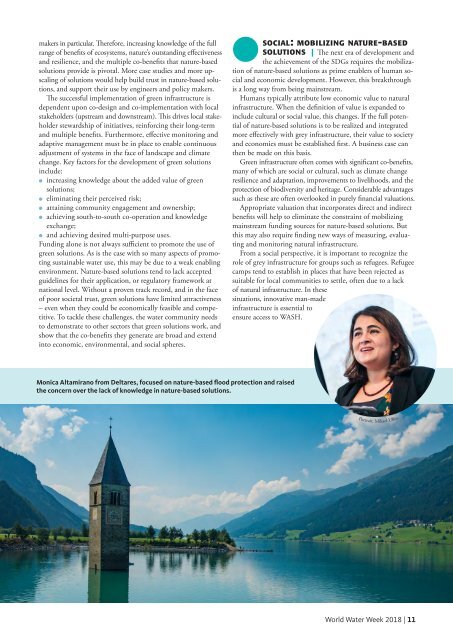World Water Week 2018: Overarching conclusions
Create successful ePaper yourself
Turn your PDF publications into a flip-book with our unique Google optimized e-Paper software.
makers in particular. Therefore, increasing knowledge of the full<br />
range of benefits of ecosystems, nature’s outstanding effective ness<br />
and resilience, and the multiple co-benefits that nature-based<br />
solutions provide is pivotal. More case studies and more upscaling<br />
of solutions would help build trust in nature-based solutions,<br />
and support their use by engineers and policy makers.<br />
The successful implementation of green infrastructure is<br />
dependent upon co-design and co-implementation with local<br />
stakeholders (upstream and downstream). This drives local stakeholder<br />
stewardship of initiatives, reinforcing their long-term<br />
and multiple benefits. Furthermore, effective monitoring and<br />
adaptive management must be in place to enable continuous<br />
adjustment of systems in the face of landscape and climate<br />
change. Key factors for the development of green solutions<br />
include:<br />
●●<br />
increasing knowledge about the added value of green<br />
solutions;<br />
●●<br />
eliminating their perceived risk;<br />
●●<br />
attaining community engagement and ownership;<br />
●●<br />
achieving south-to-south co-operation and knowledge<br />
exchange;<br />
●●<br />
and achieving desired multi-purpose uses.<br />
Funding alone is not always sufficient to promote the use of<br />
green solutions. As is the case with so many aspects of promoting<br />
sustainable water use, this may be due to a weak enabling<br />
environment. Nature-based solutions tend to lack accepted<br />
guidelines for their application, or regulatory framework at<br />
national level. Without a proven track record, and in the face<br />
of poor societal trust, green solutions have limited attractiveness<br />
– even when they could be economically feasible and competitive.<br />
To tackle these challenges, the water community needs<br />
to demonstrate to other sectors that green solutions work, and<br />
show that the co-benefits they generate are broad and extend<br />
into economic, environmental, and social spheres.<br />
social: mobilizing nature-based<br />
solutions | The next era of development and<br />
the achievement of the SDGs requires the mobilization<br />
of nature-based solutions as prime enablers of human social<br />
and economic development. However, this breakthrough<br />
is a long way from being mainstream.<br />
Humans typically attribute low economic value to natural<br />
infrastructure. When the definition of value is expanded to<br />
include cultural or social value, this changes. If the full potential<br />
of nature-based solutions is to be realized and integrated<br />
more effectively with grey infrastructure, their value to society<br />
and economies must be established first. A business case can<br />
then be made on this basis.<br />
Green infrastructure often comes with significant co-benefits,<br />
many of which are social or cultural, such as climate change<br />
resilience and adaptation, improvements to livelihoods, and the<br />
protection of biodiversity and heritage. Considerable advantages<br />
such as these are often overlooked in purely financial valuations.<br />
Appropriate valuation that incorporates direct and indirect<br />
benefits will help to eliminate the constraint of mobilizing<br />
mainstream funding sources for nature-based solutions. But<br />
this may also require finding new ways of measuring, evaluating<br />
and monitoring natural infrastructure.<br />
From a social perspective, it is important to recognize the<br />
role of grey infrastructure for groups such as refugees. Refugee<br />
camps tend to establish in places that have been rejected as<br />
suitable for local communities to settle, often due to a lack<br />
of natural infrastructure. In these<br />
situations, innovative man-made<br />
infrastructure is essential to<br />
ensure access to WASH.<br />
Monica Altamirano from Deltares, focused on nature-based flood protection and raised<br />
the concern over the lack of knowledge in nature-based solutions.<br />
Portrait: Mikael Ullén<br />
<strong>World</strong> <strong>Water</strong> <strong>Week</strong> <strong>2018</strong> | 11


















